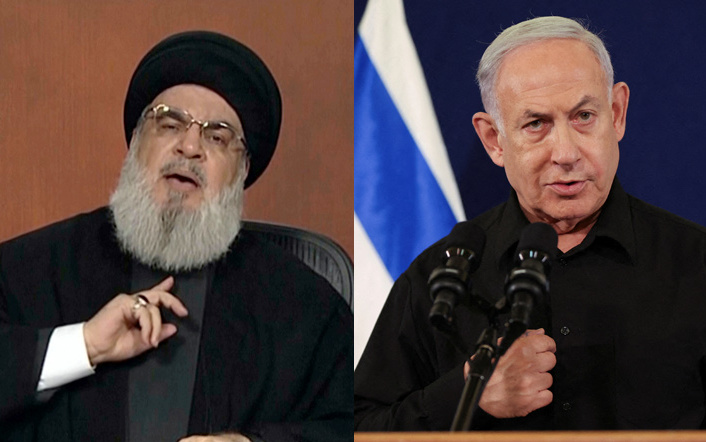Lebanon’s Hassan Nasrallah and Israel’s Benjamin Netanyahu
UPDATE, JULY 2:
With cross-border fire continuing on northern Israel and southern Lebanon, I joined India’s WION on Tuesday to evaluate if there will be a wider war between the Israelis and Hezbollah.
I explain why the most important variable is the position of Israeli Prime Minister Benjamin Netanyahu. Needing perpetual violence to avoid his political and legal reckoning after nine months of inconclusive if deadly attacks on Gaza, Netanyahu — despite likely opposition from Israel’s military — could press for an expansion of the conflict on the northern front.
Watch from 3:04:
ORIGINAL ENTRY, JUNE 20: With rocket, missile, and drone attacks escalating on both sides of the Israel-Lebanon border, I joined France 24 English’s Oliver Farry on Thursday to evaluate the prospect of an all-out war between the Israelis and the Lebanese organization Hezbollah.
While urging caution, I assess that — despite the political and military problems of Israeli Prime Minister Benjamin Netanyahu, entangled in his open-ended war in Gaza, and the bombastic rhetoric of Hezbollah’s Hassan Nasrallah — we are not yet at that point.
I look at the political and military calculations of both sides and of Hezbollah’s backer Iran.
Logically, each should be averse to a more intense conflict, given the costs that would be incurred. But will logic prevail? Keep an eye in Israel on Defense Minister Yoav Gallant and in Lebanon on whether Nasrallah is just thumping his chest for his domestic base.
Both sides are posturing. Each believes that the other is in a bit of trouble. But an all-out war means that both sides have crossed a red line and there is no easy way back from that.


Trackbacks/Pingbacks